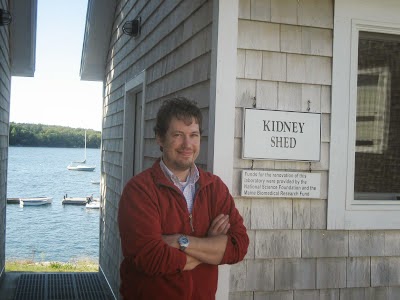 This fall I attended the fourth annual Origins of Renal Physiology course for nephrology fellows at the Mount Desert Island Biological Laboratory (MDIBL). The course was designed to allow fellows an opportunity to connect with the historical roots of renal physiology and to gain perspective through comparative physiology. The founder of this blog, Nathan Hellman, attended the first course and blogged about his experience in 2008.
This fall I attended the fourth annual Origins of Renal Physiology course for nephrology fellows at the Mount Desert Island Biological Laboratory (MDIBL). The course was designed to allow fellows an opportunity to connect with the historical roots of renal physiology and to gain perspective through comparative physiology. The founder of this blog, Nathan Hellman, attended the first course and blogged about his experience in 2008. The course took place on the coast of Maine at the MDIBL, a place with great historical and modern day significance for renal physiology. George Dorr, who founded Acadia National Park with John D. Rockefeller, had the foresight to recognize the potential value of the island for the scientific community. He offered land for two labs, the MDIBL and the Jackson Laboratory (which also continues to operate on the island with tremendous success). The MDIBL is where E. K. Marshall discovered and described active tubular transport in the goosefish in the 1920’s. It is where Homer Smith wrestled with the concepts of clearance, GFR, and effective renal blood flow and worked out calculations based on his studies in marine animals. He did ground breaking experiments in the lab and wrote a number of manuscripts and books in his cottage on the campus describing these fundamental concepts. For 35 years, he spent his summers working at the MDIBL. Roberts Pitts called this time the “Smithian Era of renal physiology”. Homer Smith brought many others to the island to work on renal physiology, and over the years a number of important discoveries have been made at the MDIBL. The lab continues to be a place of excellence, active in research.
The annual course brings fellows back to this historical place and places them under the mentorship of a distinguished faculty. Mark Zeidel serves as the course director and every year he brings in a remarkable faculty from across the country to distill fundamental concepts of renal physiology in a historical and comparative context. They do this by dividing the course up into six modules. Each fellow participates in three of the six modules with each module lasting for two days. The modules split the kidney up into functional units beginning with the glomerulus and continuing on through the proximal tubule, the loop of Henle, and the distal tubule. They also covered salt and water homeostasis and renal genetics. On the first day of each module, we worked with the faculty in the lab performing experiments using classic physiology model systems such as the toad bladder, the shark rectal gland, the zebrafish, and the xenopus oocyte. We developed a presentation based on our experiments to share with the group on the morning of the second day of each module. Even though we only work with three of the modules each year, we learned what the other groups were doing through the peer presentations. The afternoons after the presentations were spent exploring the island and Acadia National Park. There were organized outings for hiking, biking, and kayaking. We finished the week with a big lobster bake at a park on the seawall.
I have had the great pleasure of attending the course each of the last two years, participating in all six modules. I told my wife when I got home each time that I felt like a kid at camp. Only instead of the usual camp games, we were playing with kidneys and urine. These were tremendous experiences that I will carry with me throughout my career in nephrology. It was great to meet and work with faculty and fellows from across the country. I came away with an enhanced understanding of physiology and a renewed enthusiasm for all things renal. As you make your schedules out for next year, I would encourage you to consider setting aside some time to attend next year’s course, September 2-9.
Posted by Michael Hovater MD








































